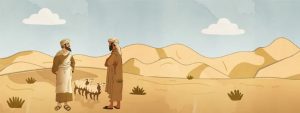
Art by Sefira Lightstone
A WEEKLY TORAH THOUGHT FROM RABBI MORDY
Rivkee and I were visiting friends in Wyoming this week and took a day trip to Yellowstone National Park. It was truly an experience. The geysers and hot springs were like nothing I have ever seen; it was memorable to say the least. Having spent about a day there, we ventured back to our friends’ home and got stuck in terrible traffic. We figured it was just the usual summer congestion in our national parks, but we were a bit bummed watching the ETA on our GPS continue to climb. And suddenly we came upon what was causing the delay: A bison was making his way down the road at his leisurely pace and passersby slowed to avoid hitting him, (and, of course, to get a good look and picture!)

This week we read a double Parsha (Matos-Maasei) that concludes the Book of Numbers (Bamidbar). This Monday also begins the “9 Days” which lead up to and include Tisha B’Av. Tisha B’Av is the day both Temples in Jerusalem were destroyed and is historically the saddest day on the Jewish calendar. These nine days are commemorated by a sense of subdued joy. Traditionally, we don’t schedule weddings, concerts, haircuts or even travel for the sake of pleasure if possible. We avoid drinking wine and eating meat (except for on Shabbat when they are part of a joyous meal). In general, we downplay activities that bring us pleasure. So what can we take from these Parsha(s) to get us through this difficult time period? And why am I telling you anything that happened to me this week? I know that I, for one, can’t wait until a week from Wednesday when this period is over and we can go back to our regularly scheduled programming! Just as we couldn’t wait to get out of the traffic and hit the gas!
Parshas Maasei recounts the various starts and stops of the Jewish people’s journey in the desert. Forty-two times in all, the Jewish people packed up and moved along before settling down again somewhere else along the way. There is much discussed regarding this recounting but an overall question persists: If these were merely stops on an enormously important journey, why was it necessary to recount every time they rested along the way? It is the destination that really matters!
Therein lies our lesson. Sure, there are times we are on a journey looking forward to the destination. But let us not lose sight of the road. There are lessons to be learned and things to be appreciated even while sitting on that monotonous, long path that we are eager to find the end of. But perhaps we should just stop and appreciate the moment. There is so much to be gained by just being present and not constantly looking forward. That bison was a stark reminder of it for me. Let’s all make the most of wherever we are—G-d always has a reason for it. Good Shabbos!





